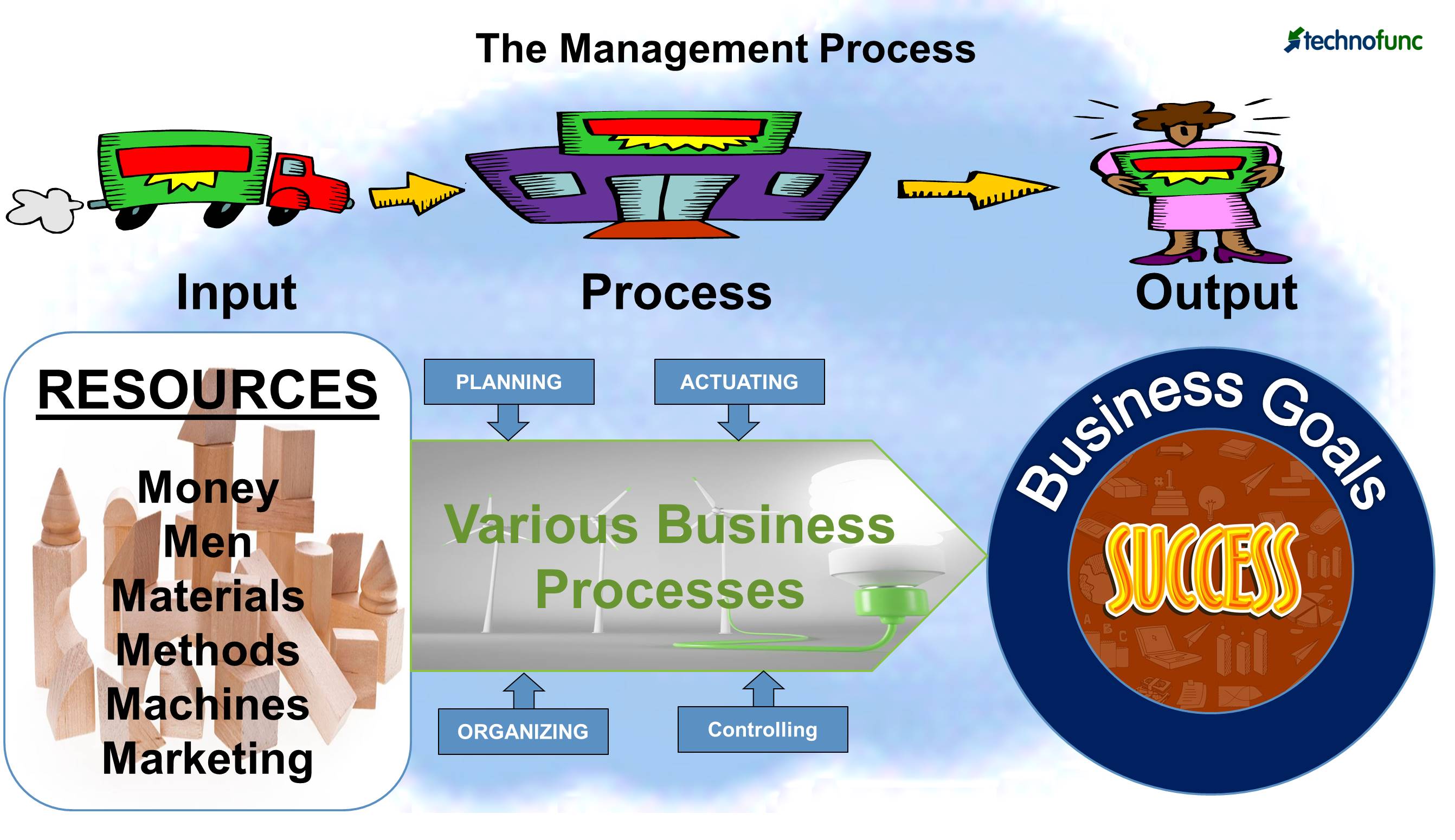- Home
- Business Processes
- Industry Knowledge
- Aerospace Industry
- Automotive Industry
- Banking Domain
- BFSI Industry
- Consumer/ FMCG Industry
- Chemicals Industry
- Engineering & Construction
- Energy Industry
- Education Domain
- Finance Domain
- Hospitality Domain
- Healthcare Industry
- Insurance Domain
- Retail Industry
- Travel and Tourism Domain
- Telecom Industry
- Leadership Skills
- eLearning
- Home
- Leadership Skills
- Leadership & Management
- Concept of Management
Concept of Management
The concept of management refers to the process of planning, organizing, staffing, directing, coordinating, and controlling to achieve organizational goals. It is the management of human, physical, financial, and other valuable resources of the organization in an effective and efficient manner to achieve business objectives.
Different people have conceived and defined management in different ways. But, the essence of management lies in determining worthwhile goals and then carefully selecting and utilizing resources through efficient and effective planning, organizing, actuating, and controlling to achieve those goals.
Who is a Manager?
You are a manager. What does this mean? The word derives from the ancient French word for handling horses and a later one for handling the affairs of the kitchen. Cynics might replace horses with donkey, but all would see the analogy of keeping an organization alive through the activities of the kitchen. Probably the one that is most simple, popular, and often quoted by many in general is "getting things done through other people."
Let us now look at different definitions that highlight important aspects of management.
- Management is a distinct process consisting of activities of planning, organizing, actuating and controlling, performed to determine and to accomplish stated objectives with the use of human beings and other resources (Martin, 1977).
- Good management is merely the exercise of common sense and the Golden Rule (Daniel, 1976)
- The six M’s (money, men, materials, methods, machines, and marketing) of management or the basic resources, as they are often called, are subjected to the fundamental functions of management - planning, organizing, actuating, and controlling -to achieve stated objectives.
- Management is an art struggling to become a science.
- Management science is a body of systematized knowledge accumulated and accepted with reference to the understanding of general truths concerning management.
- The art of management is a personal creative power plus skill in performance. The contemplation of problems, events, and possibilities develops personal creative power, while experience, observation, and study of results contribute to skilled performance. It other words, management art involves envisioning an orderly whole from chaotic parts, communicating the vision, and achieving the goal. It is the "art of arts" because it organizes and uses human talent (Boehringer, 1975)

From these definitions, we can infer that the principles and the techniques of management are not only applicable to the business world but they can be equally applied universally. They also find application in social, religious, charitable, and non-profit organizational contexts.
Essentially we can conclude that management is the integration of human and other resources in a manner that leads to effective utilization and harmonization of the individual efforts with organizational goals.
Suggested Reading and Resources
Related Links
You May Also Like
-
Teams are part of the modern organizational culture. Whether you are a team leader or a team member, having a better understanding of how teams work, and being able to identify where the team is in the process, is a critical part of ensuring the team is ultimately successful. Start with the basics and understand what a team is and what role they play in an organization.
-
In today's business world, proficiency in management skills is essential for career growth and success. Managerial skills can be defined as attributes or abilities that are essential for every leader and manager to succeed and fulfill specific tasks expected from them by the organization.
-
Management Principles by Fayol
Henri Fayol (1849-1925), a French industrialist and a prominent European management theorist, developed a general theory of management. Fayol outlined the fourteen principles of management.
-
Many different types of teams have been identified by social scientists. Managers may encounter the diverse types of challenges while managing different kinds of teams. Challenges associated with Cross-Functional Teams might be different from that of a Geographically Dispersed Team or a Virtual Team. This article explores some common categories and subtypes of teams.
-
Quantitative Theory of Management
The quantitative management approach is given by the mathematical school that recommends the use of computers and mathematical techniques to solve complex management issues and assist in the managerial decision-making process. Managers observe historical quantitative relationships and use quantitative techniques such as statistics, information models, and computer simulations to improve their decision making.
-
Thinking & Problem Solving Skills
Today's dynamic business world demands that you make decisions that significantly boost productivity and drive competitive advantage. But how do you know whether a decision will benefit the organization? And how do you know that the decisions are based on rational and statistical reasoning? Explore how to become a dynamic problem solver with the skills to make accurate decisions.
-
All the teams are dynamic in nature and they take time to come together, they form, develop, and grow in stages, over a period of time. Teams go through five progressive stages: Forming, Storming, Norming, Performing and Adjourning. In this article, we want to introduce you to these stages of team development and certain strategies that you can use to help the team grow and develop in each of these stages.
-
Team leadership theory is a recent leadership theory that does not discriminate between the leader and the other team members. The approach considers contributions from each team member to be critical for organizational success. This approach focused on the overall team effectiveness and team problems are diagnosed and action is taken to remediate weakness. This approach provides for taking corrective action when the leader deems necessary.
-
Maslow's hierarchy of needs is a motivational theory that explains that people are motivated by five basic categories of human needs. These needs are physiological, safety, love and belonging, esteem, and self-actualization. There is a little scientific basis for this concept of a hierarchy of needs.
-
In this study of power, Raven identified five bases of power as coercive, reward, legitimate, referent, and expert. The 5 Types of Power can help you decide when it is appropriate to use a particular type of power in important situations. Leadership involves authority and it is very important for leaders to understand what type of power they're using.
Explore Our Free Training Articles or
Sign Up to Start With Our eLearning Courses

About Us
Learning
© 2023 TechnoFunc, All Rights Reserved










